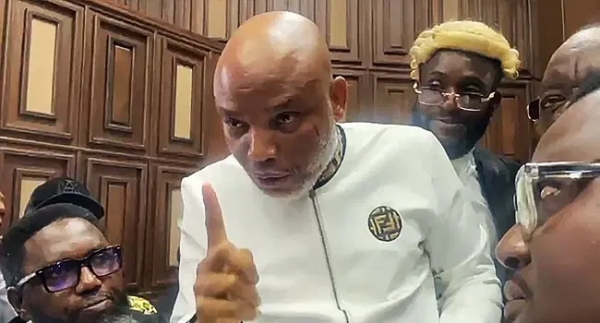- shelves plan to call Uzodimma, Wike, Malami, Sanwo-Olu, others as witnesses
- as court adjourns case to Nov 4
The trial of the detained leader of the Indigenous People of Biafra (IPOB), Nnamdi Kanu, took a dramatic turn on Monday as he announced that he would no longer defend the terrorism-related charges filed against him by the Federal Government.
At the resumed hearing before the Federal High Court in Abuja, Kanu—who had earlier dismissed his legal team and chosen to represent himself—told the court he would not proceed with his defence, insisting that the charges against him were invalid.
Speaking from the dock, the IPOB leader said that after carefully reviewing the case file, he found no legitimate charge warranting a defence.
He argued that since the trial was based on what he described as an “unlawful and baseless” charge, there was no need to call witnesses or offer any further explanation.
As a result, Kanu withdrew his earlier request for the court to summon several high-profile individuals he had listed as witnesses.
Kanu, who has been in detention since 2021, had previously filed a motion seeking permission to call 23 witnesses, including serving governors, ministers, and former security chiefs.
Among those listed were the Governor of Imo State, Hope Uzodimma; the Governor of Lagos State, Babajide Sanwo-Olu; the Minister of the Federal Capital Territory, Nyesom Wike; the former Attorney General of the Federation, Abubakar Malami; and the former Chief of Army Staff, Gen. Tukur Buratai (rtd).
Others on the list included the Minister of Works, Dave Umahi; former Abia State Governor, Okezie Ikpeazu; former Minister of Defence, Gen. Theophilus Danjuma (rtd); former Director-General of the National Intelligence Agency, Ahmed Rufai Abubakar; and the former Director-General of the Department of State Services (DSS), Yusuf Bichi.
In the motion dated October 21 and marked FHC/ABJ/CR/383/2015, Kanu had asked for a 90-day extension—beyond the initial six days granted—to enable him to call and conclude testimony from his witnesses.
However, during Monday’s proceedings, he abandoned the plan entirely.
Consequently, the court adjourned the matter to November 4, 5, and 6 for the adoption of final written addresses.
Before adjourning, trial judge, Justice James Omotosho advised Kanu to seek counsel from criminal law experts to fully understand the implications of his decision.
It will be recalled that the court had earlier dismissed Kanu’s no-case submission, ruling that the evidence presented by the prosecution was sufficient to warrant him entering a defence.
Kanu had argued that the five witnesses presented by the Federal Government failed to prove that he committed any offence known to law.




